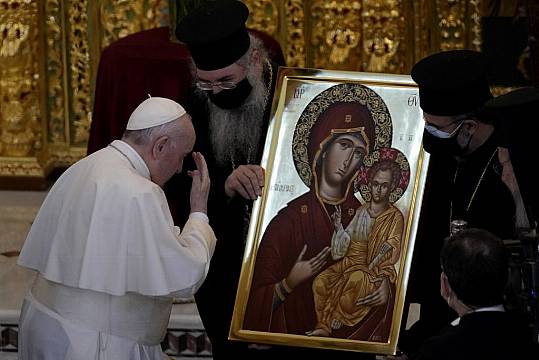The Pope has lamented centuries of hostility and prejudice that have divided Catholics and Orthodox as he met the leader of Cyprus’s Greek Orthodox Church.
Archbishop Chrysostomos II hosted Francis for private talks at his residence and invited him to the new Orthodox Cathedral of St Barnabas for an encounter with the Holy Synod, the highest decision-making body of the Greek Orthodox Church.
Sitting in front of the gilded iconostasis, or altar, as the Orthodox clergymen chanted, Francis spoke of the “broad furrows” that history had cleaved between Catholics and Orthodox as a result of the 1,000 year-old split, when God wanted all Christians united.

“Centuries of division and separation have made us assimilate, even involuntarily, hostility and prejudice with regard to one another, preconceptions often based on scarce and distorted information, and spread by an aggressive and polemical literature,” Francis said.
“This too makes crooked the path of God, which is straight and directed to concord and unity.”
He said concrete joint works of charity, education and efforts to promote human dignity can help Catholics and Orthodox “rediscover our fraternity, and communion will mature by itself, to the praise of God”.

Two Orthodox bishops attended Francis’s Mass later at Nicosia’s main sports stadium for Cyprus’s tiny Catholic community.
The stadium, which seats 22,000, was less than half full and Francis eschewed his usual popemobile to greet the faithful before the Mass.
Francis urged a message of unity in a country lacerated by divisions, even among Catholics, saying: “Healing takes place when we carry our pain together, when we face our problems together, when we listen and speak to one another.”
Archbishop Chrysostomos said the Cypriot church enjoys “excellent relations” with all churches and has in recent years pursued dialogue with Muslim leaders in the Middle East – an effort he said was largely ruined by “extremist elements” who “inflamed passions”.

“We resolutely believe in the peaceful resolution of our differences, whether those are ethnic or religious. And the only correct course is through a genuinely sincere dialogue,” he said.
Although Cyprus comprises a tiny part of the Eastern Orthodox community with around 800,000 faithful, Cypriot church leaders point to the Mediterranean island’s role as the “gateway” to Christianity’s westward expansion owing to its proximity to the faith’s birthplace.
Christianity first spread to Cyprus in 45 AD, when the Apostle Paul converted the island’s Roman governor, Sergius Paulus, while on the first stop of his first mission to spread the faith.
The Cypriot Church was itself said to have been founded by another apostle, Barnabas.
Francis has made Cyprus’s connection to the roots of Christianity a focal point of his visit, which ends on Saturday when he heads to Greece.
Cypriot Church leaders are keen to strengthen ties with the Holy See since minority Christian communities in nearby countries fear that their faith is under attack amid armed conflicts.







